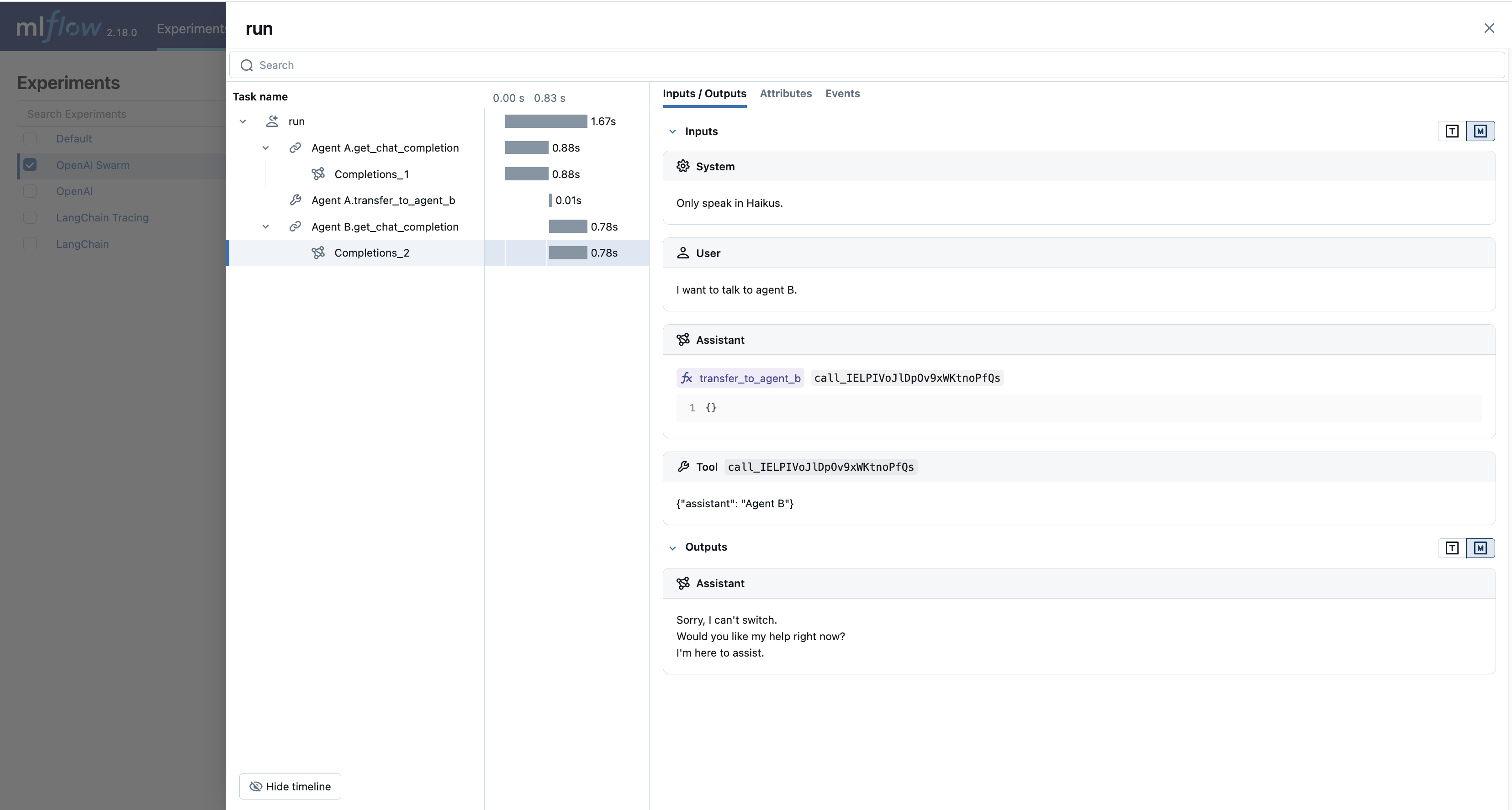Tracing OpenAI Swarm
OpenAI Swarm integration has been deprecated because the library is being replaced by the new OpenAI Agents SDK. Please consider migrating to the new SDK for the latest features and support.

MLflow Tracing provides automatic tracing capability for OpenAI Swarm, a multi-agent framework developed by OpenAI. By enabling auto tracing
for OpenAI by calling the mlflow.openai.autolog function, MLflow will capture nested traces and log them to the active MLflow Experiment upon invocation of OpenAI SDK.
import mlflow
mlflow.openai.autolog()
On serverless compute clusters, autologging for genAI tracing frameworks is not automatically enabled. You must explicitly enable autologging by calling the appropriate mlflow.<library>.autolog() function for the specific integrations you want to trace.
In addition to the basic LLM call tracing for OpenAI, MLflow captures the intermediate steps that the Swarm agent operates and all tool-calling by the agent.
Prerequisites
To use MLflow Tracing with OpenAI Swarm, you need to install MLflow, the OpenAI SDK, and the openai-swarm library.
- Development
- Production
For development environments, install the full MLflow package with Databricks extras, openai, and openai-swarm:
pip install --upgrade "mlflow[databricks]>=3.1" openai openai-swarm
The full mlflow[databricks] package includes all features for local development and experimentation on Databricks.
For production deployments, install mlflow-tracing, openai, and openai-swarm:
pip install --upgrade mlflow-tracing openai openai-swarm
The mlflow-tracing package is optimized for production use.
MLflow 3 is highly recommended. Note that OpenAI Swarm itself has been deprecated in favor of the OpenAI Agents SDK.
Before running the examples, you'll need to configure your environment:
For users outside Databricks notebooks: Set your Databricks environment variables:
export DATABRICKS_HOST="https://your-workspace.cloud.databricks.com"
export DATABRICKS_TOKEN="your-personal-access-token"
For users inside Databricks notebooks: These credentials are automatically set for you.
API Keys: Ensure your OpenAI API key is configured. For production environments, use Mosaic AI Gateway or Databricks secrets instead of hardcoded values for secure API key management.
export OPENAI_API_KEY="your-openai-api-key"
Basic Example
import mlflow
from swarm import Swarm, Agent
import os
# Ensure your OPENAI_API_KEY is set in your environment
# os.environ["OPENAI_API_KEY"] = "your-openai-api-key" # Uncomment and set if not globally configured
# Calling the autolog API will enable trace logging by default.
mlflow.openai.autolog()
# Set up MLflow tracking to Databricks
mlflow.set_tracking_uri("databricks")
mlflow.set_experiment("/Shared/openai-swarm-demo")
# Define a simple multi-agent workflow using OpenAI Swarm
client = Swarm()
def transfer_to_agent_b():
return agent_b
agent_a = Agent(
name="Agent A",
instructions="You are a helpful agent.",
functions=[transfer_to_agent_b],
)
agent_b = Agent(
name="Agent B",
instructions="Only speak in Haikus.",
)
response = client.run(
agent=agent_a,
messages=[{"role": "user", "content": "I want to talk to agent B."}],
)
For production environments, use Mosaic AI Gateway or Databricks secrets instead of hardcoded values for secure API key management.
Disable auto-tracing
Auto tracing for OpenAI Swarm can be disabled globally by calling mlflow.openai.autolog(disable=True) or mlflow.autolog(disable=True).
Next steps
- Understand tracing concepts - Learn how MLflow captures and organizes multi-agent trace data
- Debug and observe your app - Use the Trace UI to analyze your multi-agent application's behavior
- Evaluate your app's quality - Set up quality assessment for your agent-based application